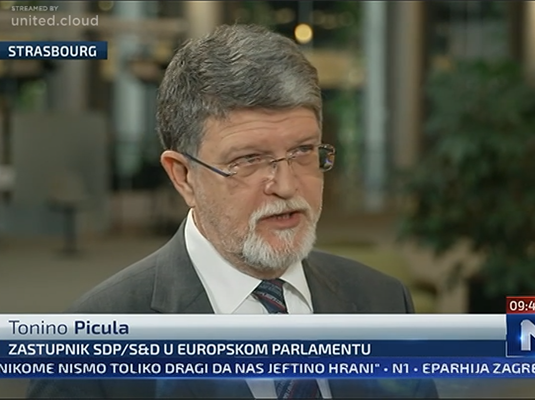"The European Union, if it wants to survive this very turbulent third decade of the 21st century, will have to change the way it functions and how it responds to different crises. Whether it's crises that press from the outside or those that develop within the European Union."
Picula added: “Let's not forget, in the confrontation with its geopolitical rivals, Russia, China, but also in seeking cooperation with its strategic partners like the USA, it is increasingly apparent that the European Union is a community of states, not a joint state. To improve the functioning of the European Union, a middle ground will have to be found.”
“If today's Hungary were actually a state not a member of the EU, but showing aspirations towards EU membership, it would hardly have reached the status of a candidate, let alone a member of the EU. Exactly this Hungary, but not only it, at this moment is doing everything to block some very important EU policies, which are not just a political identity but prevent the EU from being much more functional in some crises that directly concern it, such as the war in Ukraine or the escalation of the war in the Middle East.”
Picula says that those who think EU reform would mean losing the chance to protect national identities are panicking without reason.
“I think a kind of panic is being created without reason. It is about a process that will be modified by a whole series of proposals that will ultimately lead to some result that will protect the right of all EU member states, including the smallest ones, to be able to co-decide on vital examples. What I would like to see is the EU being more efficient in overcoming the blockades that are already its reality.”
From HDZ, Picula was told that by voting he turned his back on national interests. “Which part of the HDZ am I discussing with? They were not homogeneous when it came to voting on retaining the right of veto, only one member of HDZ voted for that principle, and three of them sided with the opponents of the veto. If a treasonous process needs to be initiated, that is a matter of their internal discussion. I think it is about an under-capacitated group of politicians who have strayed into the EP and who compensate for incompetence with eloquent statements. They vote against the right of states to use the veto. Let them explain that,” he says.
Picula also commented on the situation in the Western Balkans. He says the Council of Europe's report well represented the situation. “If we talk about the fragility of democracy somewhere, then it is the Western Balkans,” says Picula, adding that the end of 2023 is less favorable for this area than some previous times. Croatia must be especially careful because it borders states that are experiencing delays on the European path, he warns.
Regarding the latest in a series of conflicts between Croatian and Serbian diplomacy, which culminated in the expulsion of diplomats, Picula says Vučić controls the media in Serbia, most of them, which have for some time been pushing the personal endangerment of the Serbian president. “A new part of the pre-election folklore is the announcement that Belgrade will be flooded with foreign agencies. He is obsessed with Croatia, expelling diplomats is the furthest he can go in escalating with Croatia,” he says.


